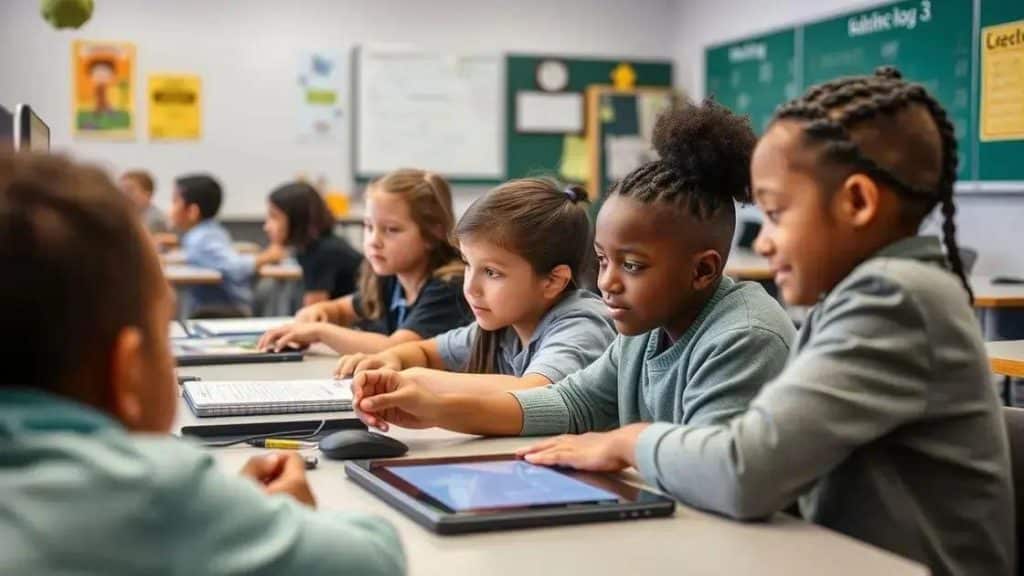Recent patterns in academic success: 2025 outlook

Enhancing learning outcomes involves using active learning techniques, personalized approaches, and technology integration while providing continuous feedback to support student progress and engagement.
Recent patterns in academic success reveal significant shifts that could define the educational landscape in 2025. Have you ever wondered how these patterns will shape the future of learning? Let’s delve into this intriguing topic.
Emerging trends in student performance
Emerging trends in student performance are transforming the educational landscape. Understanding these trends can help educators and students alike. As we look forward to 2025, several key factors are influencing how students learn and achieve.
Technological Integration
Technology is playing a pivotal role. Students today are using various tools that aid their learning. Devices like tablets and laptops are common in classrooms. This shift leads to several positive outcomes.
- Enhanced engagement through interactive platforms.
- Access to a wealth of online resources.
- Improved collaboration among peers.
This integration of technology means students are not just passive learners. They actively participate in shaping their educational journey.
Focus on Social-Emotional Learning
Another trend gaining momentum is the emphasis on social-emotional learning. Schools are increasingly recognizing that emotional health is vital for academic success. Fostering skills such as resilience and empathy is essential.
By incorporating social-emotional components into curricula, educators can create a supportive environment. This helps students feel more connected and motivated. Moreover, students who build strong relationships are often more successful in their studies.
Personalized Learning Approaches
One major trend is the move towards personalized learning. This approach tailors educational experiences to individual student needs. It recognizes that each learner has unique strengths, weaknesses, and interests.
- Custom learning paths allow for individualized pacing.
- Students can focus on topics that interest them the most.
- Adaptive technologies provide real-time adjustments based on performance.
Such customization empowers students, promoting a greater ownership of their learning.
Increased Focus on Critical Thinking
Finally, there is a significant voice calling for enhanced critical thinking skills. Educators aim to prepare students for real-world problems. This preparation drives many educational strategies today.
By engaging students in discussions, debates, and project-based learning, schools challenge them to think deeply. These strategies not only improve performance but also equip students with skills necessary for their future careers.
Impact of technology on academic success
The impact of technology on academic success is profound and multifaceted. As classrooms evolve, technology plays a crucial role in shaping how students learn and achieve their goals.
Enhanced Learning Experience
With access to various digital tools, students can enjoy a more interactive learning experience. This engagement goes beyond traditional methods. For instance, educational apps and online resources provide instant feedback and support. This immediacy helps students grasp concepts quickly.
- Interactive simulations reinforce learning.
- Video tutorials offer varied explanations.
- Online forums enhance collaboration and discussion.
Through these resources, learning becomes a dynamic journey, allowing students to explore topics in depth.
Accessibility and Flexibility
Another key aspect is the accessibility it brings to students. Technology ensures that educational materials are available anytime, anywhere. This flexibility allows learners to manage their time effectively.
Whether accessing materials on a laptop or a smartphone, students can balance their studies with other commitments. This ability fosters greater independence and responsibility in their learning.
Data-Driven Insights
Moreover, technology offers data-driven insights that can enhance academic outcomes. Teachers can track student progress using analytics tools. This information helps them identify areas where students struggle and adjust their teaching strategies accordingly.
- Tracking performance helps tailor instruction.
- Data identifies trends in learning behaviors.
- Regular assessments inform necessary interventions.
Such insights lead to more personalized learning experiences that can cater to individual needs, ultimately improving success rates.
Collaboration and Communication
Finally, technology enhances collaboration and communication among students and educators. Online platforms allow for real-time discussions and group projects, even when team members are not in the same physical location.
This increased collaboration fosters teamwork and helps students develop essential skills that employers value. As they work together on assignments, they learn to communicate effectively and solve problems collaboratively.
Challenges educators face in 2025

The challenges educators face in 2025 are significant and varied, reflecting the rapidly changing educational landscape. As society evolves, teachers must adapt to meet the needs of their students effectively.
Integrating Technology
One major challenge is integrating technology into the classroom. While tech tools can enhance learning, many educators struggle to incorporate them effectively. It’s essential for teachers to feel comfortable with the technology they use.
- Professional development is crucial for skill enhancement.
- Teachers need ongoing support to implement new tools.
- Choosing the right technology is important for learning objectives.
Without proper training, educators may find themselves overwhelmed, leading to stress and burnout.
Addressing Diverse Learning Needs
Another significant challenge is addressing the diverse learning needs of students. Classrooms today are more varied than ever, with students coming from different backgrounds and abilities. This diversity requires tailored instructional strategies to ensure all students succeed.
Teachers must balance different learning styles while providing equal opportunities for everyone. This individualized approach can sometimes feel daunting, especially as class sizes increase.
Mental Health Awareness
Mental health awareness is also a growing concern in education. Educators must be equipped to identify and support students who struggle with mental health issues. These challenges can greatly impact academic performance and social interactions.
Creating a supportive environment is essential. Training teachers to recognize signs of distress and providing resources can make a difference. Additionally, working closely with counselors can help ensure that students receive the help they need.
Adapting to Educational Policy Changes
Finally, educators must navigate frequent policy changes that can affect their teaching. New regulations and standards can alter curricula and assessment methods with little notice. Staying informed about these changes while maintaining focus on day-to-day teaching can be overwhelming.
Effective communication with administrators and involvement in policy discussions can help teachers voice their concerns and contribute to positive changes. Collaboration among educators is also vital in adapting to these shifts.
Role of mental health in achieving success
The role of mental health in achieving success is increasingly recognized in educational settings. It is essential for students to maintain good mental health to perform their best academically and socially.
Understanding Mental Health
Mental health encompasses emotional, psychological, and social well-being. It affects how students think, feel, and act. Good mental health helps in managing stress, relates to better decision-making, and increases overall motivation.
- Strong mental health supports resilience.
- It fosters positive relationships among peers.
- Good mental health enhances concentration and focus.
Students with positive mental health are better equipped to face challenges and bounce back from setbacks.
Impact on Academic Performance
Mental health significantly impacts academic performance. When students struggle with anxiety or depression, their ability to concentrate dwindles. This can lead to lower grades and a lack of engagement in their studies. Furthermore, mental health issues can disrupt daily routines, making it difficult to keep up with assignments and participation in class.
Recognizing the signs of mental distress early can lead to timely interventions. Support from teachers, counselors, and peers is crucial in helping students navigate these challenges.
Creating a Supportive Environment
Schools play a vital role in fostering a supportive environment for mental health. This can be achieved through implementing programs that promote mental wellness. Activities such as mindfulness training and stress management workshops can be beneficial.
Moreover, encouraging open discussions about mental health reduces stigma. When students feel safe to express their feelings, they are more likely to seek help. Educators must prioritize mental well-being alongside academic success.
Collaborative Efforts to Support Students
Collaboration between teachers, parents, and mental health professionals is essential. This teamwork creates a robust support system. Schools can incorporate mental health education into their curriculum. Such initiatives benefit both students and educators by raising awareness.
Lastly, schools should provide resources for families to help children cope with mental health issues. With combined efforts, the road to achieving success becomes more attainable for all students.
Strategies for enhanced learning outcomes
Strategies for enhanced learning outcomes are essential for helping students achieve their full potential. Educators need to adopt various methods to improve engagement and understanding.
Active Learning Techniques
Active learning involves engaging students in the learning process. This can include discussions, problem-solving, and hands-on activities. By participating actively, students retain information better and develop critical thinking skills.
- Group work encourages collaboration.
- Debates stimulate critical thinking.
- Hands-on projects help apply knowledge in real-world situations.
These methods not only make learning fun but also promote deeper understanding.
Personalized Learning Approaches
Another important strategy is using personalized learning approaches. This means tailoring education to meet individual student needs. By recognizing that each student learns differently, educators can create customized learning paths.
Technology plays a huge role here. Adaptive learning platforms can adjust the difficulty of tasks based on student performance. This ensures that every learner progresses at their own pace. Frequent assessments also help in identifying the right areas of focus.
Incorporating Technology
Incorporating technology in the classroom is crucial for enhancing learning outcomes. Digital tools can provide dynamic resources that motivate students. For example, educational apps and virtual reality experiences can make learning interactive.
Moreover, online forums and collaborative platforms enable students to communicate and share ideas beyond the classroom. This connectivity enhances their learning experience significantly.
Continuous Feedback
Providing continuous feedback helps students understand their strengths and areas for improvement. Regular check-ins allow educators to assess progress and provide support when needed. Feedback should be constructive and aimed at guiding students in their learning journey.
Encouraging self-assessment is another effective strategy. When students evaluate their work, they learn to identify their own strengths and weaknesses.
Conclusion:
In summary, enhancing learning outcomes is crucial for student success. By taking advantage of active learning techniques, personalized approaches, and technology, educators can create engaging environments. Continuous feedback is essential for guiding students on their learning journeys. With these strategies, we can help students thrive academically and personally, ensuring they are well-prepared for the future.
FAQ – Questions about Enhancing Learning Outcomes
What is active learning and why is it important?
Active learning is an approach that engages students directly in the learning process, which improves retention and understanding of the material.
How can personalized learning benefit my students?
Personalized learning tailors educational experiences to each student’s needs, enabling them to learn at their own pace and improve outcomes.
What role does technology play in the classroom?
Technology enhances engagement and makes learning more interactive, providing access to various resources that can benefit students.
Why is continuous feedback essential for students?
Continuous feedback helps students understand their progress, identify areas for improvement, and guides them in their learning journey.





